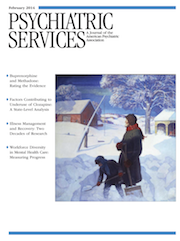Antipsychotic medications don’t work well for one-third of people with schizophrenia, and these individuals have ongoing symptoms and reduced quality of life and are at high risk of suicide. Because schizophrenia typically has an onset in young adulthood, young people whose illness is refractory to treatment may not achieve milestones considered a “normal” part of life, such as getting a job, finding a partner, or having a circle of friends.
Clozapine is a second-generation antipsychotic introduced in the 1970s in Europe. Use was abruptly stopped after a series of deaths from a rare side effect—clozapine-associated agranulocytosis. Research identified critical information that eventually led to U.S. FDA approval in 1989 and reintroduction of clozapine into clinical practice. Agranulocytosis risk can be minimized with blood monitoring. Clozapine has a unique ability to help severely ill patients whose illness is refractory to other medications. Subsequently it was demonstrated that clozapine can reduce suicidal behaviors and has broader applications for severe aggressive behaviors. For some individuals, a successful clozapine response can make the difference between being able to reach life milestones and experiencing crushing disability. Schizophrenia treatment guidelines now recommend clozapine after two failed trials of antipsychotic medications.
Given the evolution of clear strategies that can eliminate most of the risk associated with clozapine and its obvious potential benefits, it seems logical that clozapine would be widely used by experienced clinicians caring for patients with treatment-refractory schizophrenia. In this month’s issue, Stroup and colleagues present a retrospective analysis of U.S. Medicaid data for 326,119 individuals with schizophrenia who were in treatment from 2001 to 2005. Clozapine accounted for 2.5% of new antipsychotic starts overall and 5.5% of new starts among patients with treatment-refractory illness. This is far below expectations, given the estimated proportion of individuals who would warrant a clozapine trial. Findings are in line with other reports suggesting that clozapine is vastly underused.
So why is clozapine rarely used to treat the patients it may benefit? Clozapine no longer has patent protection, and lack of commercial promotion may affect clinical use in relation to other patent-protected drugs. Clinicians unfamiliar with how to manage and prevent risk may shy away from implementing clozapine, and families and consumers may not have appropriate information to allow them to be involved in decision making. Unless something changes it is likely that clozapine will continue to be underused. As Stroup and colleagues point out, it is up to our entire health community (clinicians, care systems, policy makers, and consumers) to consider this pattern and implement ways to reverse it.

